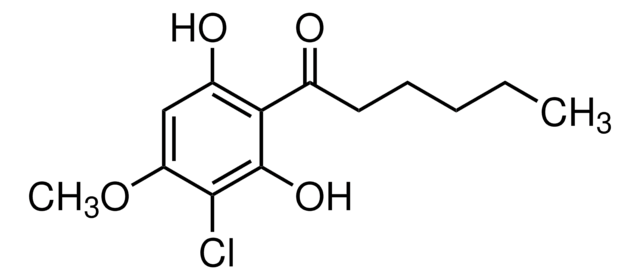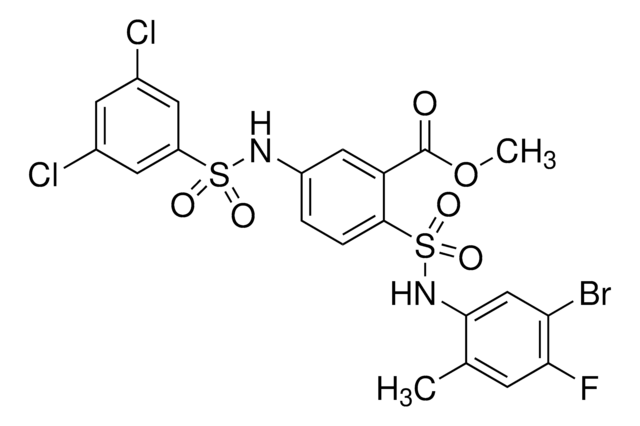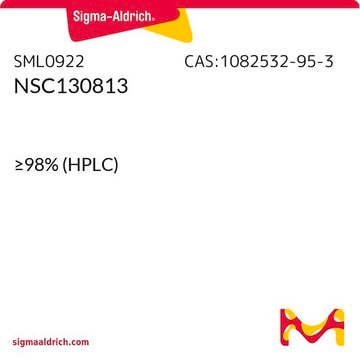SML0599
DIF-1
≥98% (HPLC)
Synonym(s):
1-(3,5-Chloro-2,6-dihydroxy-4-methoxyphenyl)-1-Hexanone
Sign Into View Organizational & Contract Pricing
All Photos(1)
About This Item
Empirical Formula (Hill Notation):
C13H16Cl2O4
CAS Number:
Molecular Weight:
307.17
UNSPSC Code:
12352200
NACRES:
NA.77
Recommended Products
Assay
≥98% (HPLC)
form
powder
color
white to beige
solubility
DMSO: 20 mg/mL, clear
storage temp.
2-8°C
InChI
1S/C13H16Cl2O4/c1-3-4-5-6-7(16)8-11(17)9(14)13(19-2)10(15)12(8)18/h17-18H,3-6H2,1-2H3
InChI key
VUDQSRFCCHQIIU-UHFFFAOYSA-N
Biochem/physiol Actions
DIF-1 (differentiation-inducing factor-1) is isolated from a Dictyostelium slime mold, and is used to inhibit proliferation/promote differentiation in various cell lines.
DIF-1 is a cell differentiation inducing factor.
Differentiation-inducing factor-1 (DIF-1) blocks the migration and invasion of cells and decreases the expression of matrix metalloproteinase-2. It prevents the proliferation of cells using glycogen synthase kinase-3 (GSK-3)-dependent mechanism. DIF-1 is more active when compared to DIF-2 in promoting stalk cell differentiation under submerged assay conditions.
Differentiation-inducing factor-1 (DIF-1) blocks the migration and invasion of cells and decreases the expression of matrix metalloproteinase-2. It prevents the proliferation of cells using glycogen synthase kinase-3 (GSK-3)-dependent mechanism. DIF-1 is more active when compared to DIF-2 in promoting stalk cell differentiation under submerged assay conditions.
Storage Class Code
11 - Combustible Solids
WGK
WGK 3
Flash Point(F)
Not applicable
Flash Point(C)
Not applicable
Certificates of Analysis (COA)
Search for Certificates of Analysis (COA) by entering the products Lot/Batch Number. Lot and Batch Numbers can be found on a product’s label following the words ‘Lot’ or ‘Batch’.
Already Own This Product?
Find documentation for the products that you have recently purchased in the Document Library.
Christopher S Neumann et al.
Proceedings of the National Academy of Sciences of the United States of America, 107(13), 5798-5803 (2010-03-17)
Differentiation-inducing factor 1 (DIF-1) is a polyketide-derived morphogen which drives stalk cell formation in the developmental cycle of Dictyostelium discoideum. Previous experiments demonstrated that the biosynthetic pathway proceeds via dichlorination of the precursor molecule THPH, but the enzyme responsible for
Glutathione S-transferase 4 is a putative DIF-binding protein that regulates the size of fruiting bodies in Dictyostelium discoideum.
Kuwayama H, et al.
Biochemistry and Biophysics Reports, 8, 219-226 (2016)
Yoko Yamada et al.
Developmental biology, 354(1), 77-86 (2011-04-05)
Exposure of monolayer Dictyostelium cells to the signalling polyketide DIF-1 causes DimB, a bZIPtranscription factor, to accumulate in the nucleus where it induces prestalk gene expression. Here we analyse DimB signalling during normal development. In slugs DimB is specifically nuclear
Tsuyoshi Araki et al.
European journal of cell biology, 91(5), 420-425 (2012-03-01)
The Dictyostelium transcription factor STATc is tyrosine phosphorylated and accumulates in the nucleus when cells are exposed either to hyper-osmotic stress or to the prestalk-inducing polyketide DIF-1. In the case of stress STAT activation is mediated by regulated dephosphorylation; whereby
Haruhisa Kikuchi et al.
Biochemical and biophysical research communications, 377(3), 1012-1017 (2008-11-04)
The differentiation-inducing factor-1 (DIF-1) is a lipophilic signal molecule (chlorinated alkylphenone) that induces stalk cell differentiation in the cellular slime mold Dictyostelium discoideum. In addition, DIF-1 and its derivatives have been shown to possess anti-leukemic activity and glucose consumption-promoting activity
Our team of scientists has experience in all areas of research including Life Science, Material Science, Chemical Synthesis, Chromatography, Analytical and many others.
Contact Technical Service








